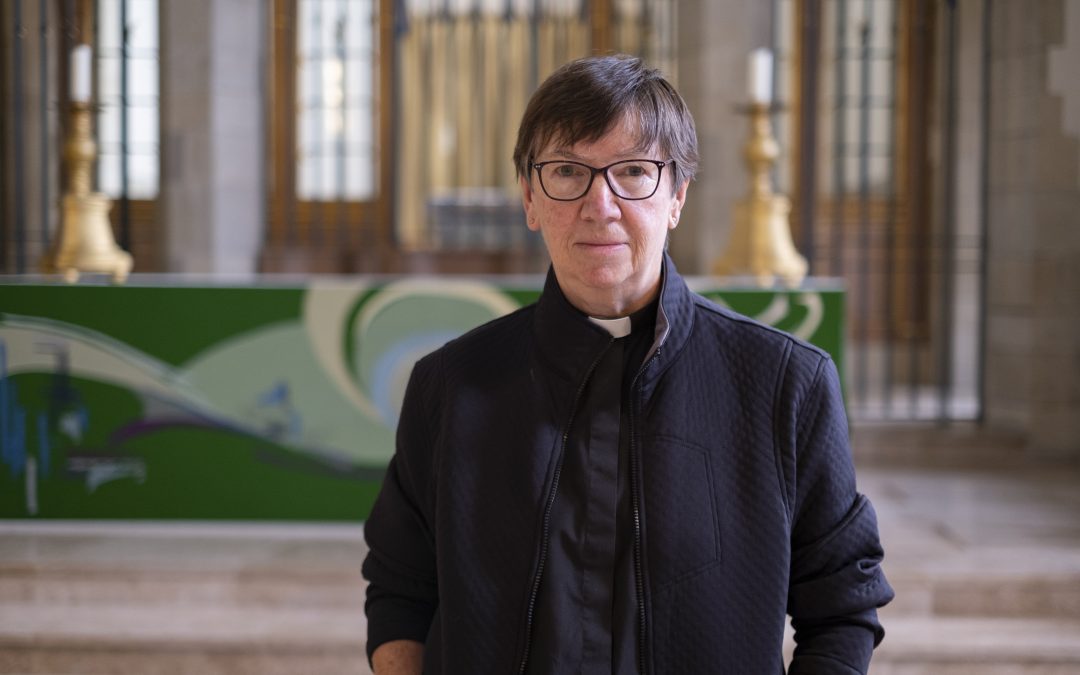Sermon by Revd Canon Myra Shackley
May the words of my mouth and the meditation of my heart be acceptable in thy sight O Lord, my strength and my redeemer.
Today marks the start of a new phase in the church’s year as we start by remembering all the Saints (although the official feast day is Tuesday) before launching tomorrow into the commercialised madness that is Halloween. Then there is All Souls on Wednesday when we remember the faithful departed and Remembrance Sunday a couple of weeks later. It is almost as though we have emerged from the positivity and light of the season of creation where we reflected on the world that is now and how we can be better stewards of it and have moved, after just a brief pause, into a few weeks when we reflect/concentrate on the nature of the world to come or, as the creed puts it ‘the communion of saints, the forgiveness of sins, the resurrection of the body and the life everlasting’.
This is not the most cheerful of seasons in which to preach so I did ask myself why I’ve been put down for today. Clearly not because of any perceived saintliness (if only). The real reason emerged when Canon Philip told me that he’d signed me up for today as it was his last service and he thought I could be trusted not to make too much fuss. So I won’t – although it is terribly tempting.
Our first challenge at this time as Christian people is to think about how we deal with Halloween, now a giant commercialized party rather than the reimagined Celtic festival of Samhain located at the turning of the season. The day creates a lot of anxiety for some people (including myself) about the trivialization of evil but we can turn this round by taking the opportunity of reflecting on the immensity and unknowability of a different aspect of God’s creation. As inhabitants of this beautiful world we are, rightly, primarily concerned with our stewardship of it and of its inhabitants and spend little time thinking that we may be the most insignificant of God’s creation. It is easy to get caught up in the lovely, positive, loving message of Jesus instructing us how best to do this and what our responsibilities are, and to forget about the rest of creation, the powers, dominions and archangels and everything that God created before the foundation of the world and thus outside time itself. And also to avoid thinking about the nature of evil and the Fall. But time and space are characteristics of our world, not God’s. He is not limited by hours, days, and years as we are. In fact, the Bible tells us that “with the Lord a day is like a thousand years, and a thousand years are like a day” (2 Peter 3:8). And I direct you to a lovely passage in the book of Job which describes the angels worshipping God as He was creating the world: “Where were you when I laid the earth’s foundation? Tell me, if you understand. Who marked off its dimensions? Surely you know! Who stretched a measuring line across it? On what were its footings set, or who laid its cornerstone – while the morning stars sang together and all the angels shouted for joy?” (Job 38:4-7).
Instead of shrinking from the zombie costumes and matted cobwebs which afflict us outside at present we might take the opportunity tomorrow to think about the inhabitants of worlds and universes unseen and unimagined, which we tend to do only on Halloween or after some great life event that shocks us from our complacency and self-centredness and asks us about our place in the cosmos and the nature of the cosmic Christ.
But today is All Saints Sunday when we have our gospel reading of the Beatitudes as a recipe for achieving sanctity. I’d like to share with you my favourite definition of a saint, which comes from the early 20th-century satirist Ambrose Bierce in his 1906 work, The Cynic’s Word Book. “A saint is a dead sinner, revised and edited.” He comments that if we knew the truth about the lives of the great champions of the church, we would find them more complicated and less holy than their legends. We would see reflections of our own lives, buoyed up with good intentions but weighed down with the limitations thrust upon us by circumstances and our own personal inadequacies.
In my former life as an old fashioned academic it used to horrify me when students used a professional proof-reader to polish their theses or dissertations. In my view it is necessary to evaluate one’s own work and mistakes, look at the flow of the text and make the necessary corrections. And the same is true of our lives. All the historic saints about whom information is available have been re-edited with their lives dissected for faults. Look at Mother Teresa– hailed in her lifetime as a living saint but someone who spent most of the years of her ministry in deep doubt, including about the existence of God. She had written to a confidant, “Jesus has a very special love for you, as for me, the silence and emptiness is so great that I look and do not see, listen and do not hear.” This terrible dark night is known to all the great mystics of the church and should be taken as a comfort to all of us who have had, or do have, doubts – because certainty about anything leads to fanaticism and fanaticism leads to lack of charity, violence and sin.
St Paul, writing to the Ephesians uses the word “saint” to describe all followers of Christ, for sainthood is the goal, what we are called to, not necessarily how we are now because we are LIVING sinners. But we have in this morning’s gospel the recipe for improvement, a better holy life. During these next few weeks as the clocks change, the weather gets colder and darker it is easy to sink into what people of my generation might think of as a Leonard Cohen state of gloom and existential angst but we should, instead, welcome the opportunity to review and edit our own lives just in case we are called to join the community of saints rather sooner than expected. Where did we go wrong? What would we do differently?
God’s grace is there for us to grow into OUR calling to be saints. This does not necessarily mean major miracles or feats of huge daring for the faith, but our God is also the God of small things. God will not call everyone to martyrdom, but he will call each and every one of us to stand up for our faith: to witness to Christ when asked at work, in the playground or in the pub; God will not ask everyone to travel to far off lands to preach the Gospel, but he will ask each and every one of us to provide the kindly word and a warm smile.
The time to edit our lives is now. In this world. While we can.
And I would like to say one last thing. In the winder church’s laudable emphasis on interfaith and intercultural relations, the position of THE church (and indeed of THIS church) in the world, and the provision of outstanding pastoral care we are in grave danger of losing one precious thing. And that is the mystical, the sense of the sacramental – an overwhelming feeling of the holiness and mystery that is God. One of the greatest gifts that Canon Philip has given this cathedral during his time here is a renewed sense of sacrament, a reminder of the other. And I, for one, am profoundly grateful. Although, without being mushy (as directed) I’ve also valued his humour, his kindness, his competence, his pronounced sense of direction in worship.
Wherever that direction leads you in the future, Philip, I am sure that I speak for the congregation in wishing you well, and in giving you my thanks. May the review of YOUR saintly life not need too much editing! AMEN

